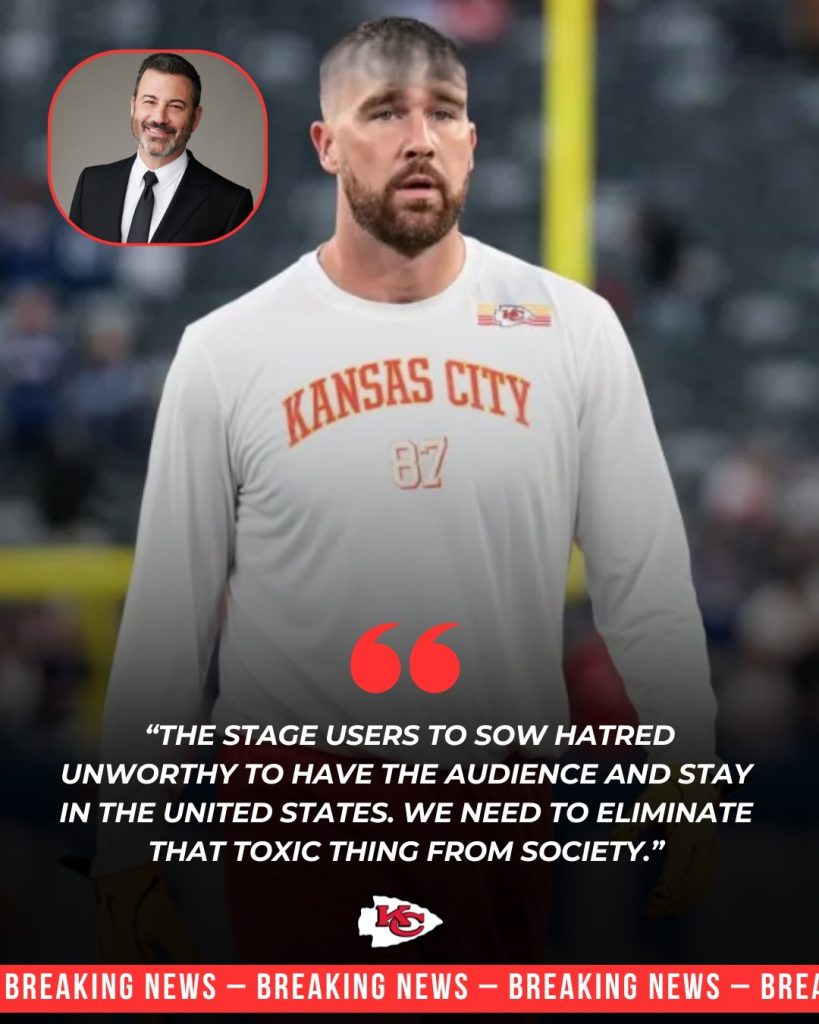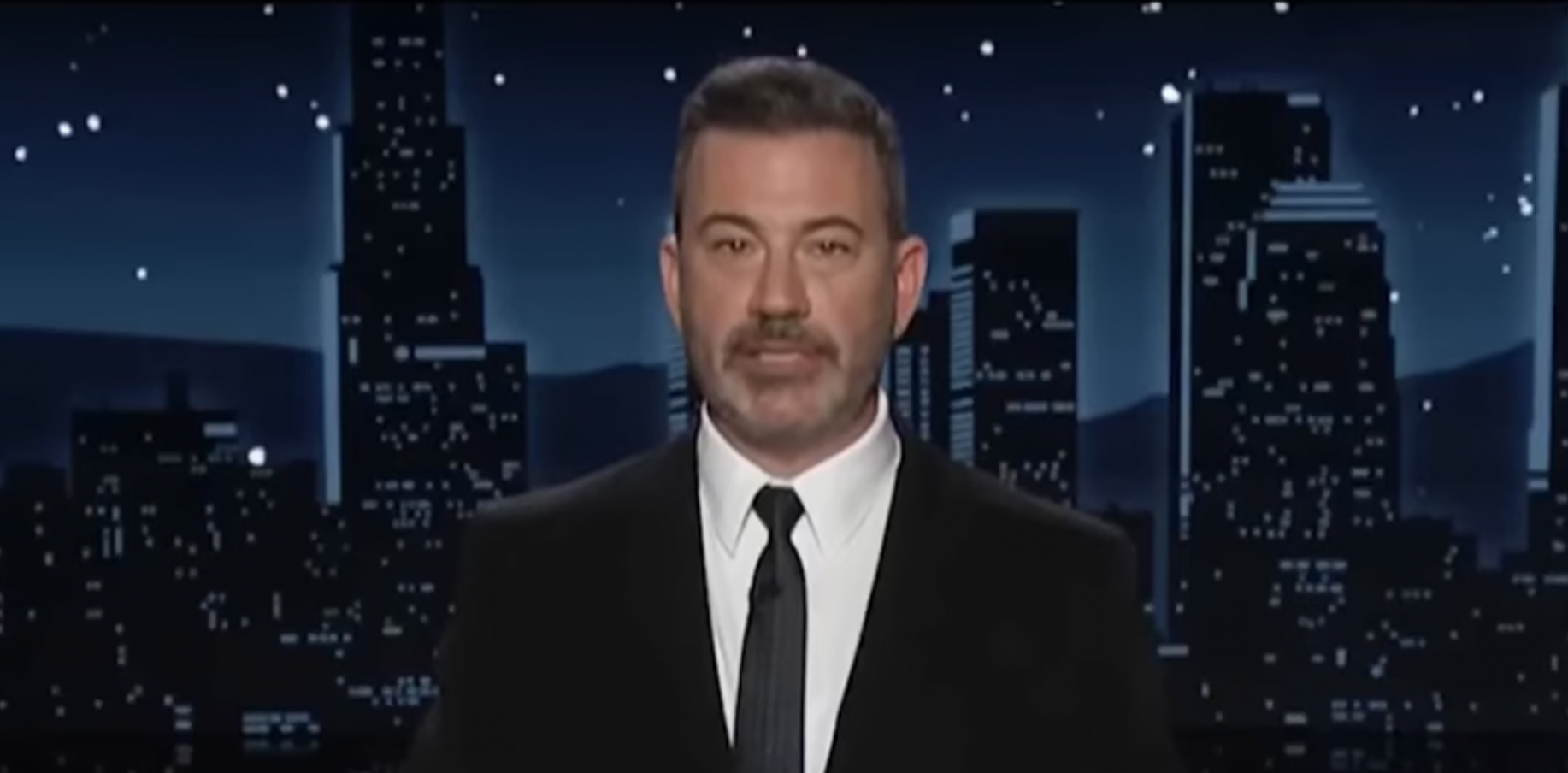Breaking Nws: Travis Kelce Sparks Firestorm With Fierce Criticism of Jimmy KimmelThe line between sports, entertainment, and politics blurred dramatically this week when NFL superstar Travis Kelce — tight end for the Kansas City Chiefs — ignited a cultural firestorm with scathing remarks about television host Jimmy Kimmel. Kelce, one of the league’s most recognizable figures, stunned fans and critics alike with his fierce denunciation of Kimmel, whose firing and subsequent ties to the shocking assassination of activist Charlie Kirk have already dominated headlines.
Kelce didn’t stop at criticism. In fiery comments, he called on Americans to boycott Kimmel’s platform entirely, declaring:
“The stage users to sow hatred are unworthy to have the audience and stay in the United States. We need to eliminate that toxic thing from society.”
The statement has reverberated across the nation, sparking debate not only about Kimmel’s fall but also about the role athletes play in America’s broader culture wars.
The Kimmel Controversy
Jimmy Kimmel, a longtime fixture of late-night television, has been under fire for years due to politically charged comedy routines that critics accused of crossing into outright hostility. According to reports, he was fired after targeting a politician in a negative monologue that finally crossed a line with both executives and advertisers.
The scandal intensified when his name became linked, in commentary and debate, to the tragic assassination of Charlie Kirk. Though not accused of direct involvement, Kimmel’s critics argue his rhetoric fostered a culture of contempt that blurred the line between satire and hatred.
For Kelce, this was more than an entertainment scandal — it was a tipping point.
Kelce’s Blistering Remarks
Speaking at a press availability that quickly went viral, Kelce cut straight to the point:
“We cannot keep rewarding people who use their stage to spit poison. If you get the privilege of an audience, you have a duty to respect that responsibility. Jimmy Kimmel was given that platform and chose to divide, mock, and demean. Enough is enough.”
Kelce’s message carried urgency, framed as a moral obligation for fans:
“Don’t just turn the TV off. Don’t just scroll past clips. Boycott thoroughly. Refuse to let this toxic influence keep poisoning our culture.”
Fans and Media React
The reaction was immediate and explosive.
- Supporters hailed Kelce as a voice of courage, finally holding Hollywood elites accountable.
- Critics accused him of overreach, saying an athlete had no business wading into the complexities of media and politics.
- Media outlets seized on the crossover appeal: a beloved Super Bowl champion challenging one of late-night TV’s biggest names.
Social media lit up with hashtags like #KelceVsKimmel, #BoycottKimmel, and #EndStageHate.
One fan tweeted: “Travis Kelce doesn’t just score touchdowns — he scores truth.”
Another shot back: “Stick to football. Linking Kimmel to Charlie Kirk’s assassination is reckless.”
The Charlie Kirk Factor
The tragedy of Charlie Kirk’s assassination has only deepened the intensity of the debate. For Kelce and others, Kirk’s death was not just political violence but a symptom of a culture corroded by mockery, scorn, and division.
By naming Kimmel as a symbol of that cultural toxicity, Kelce escalated the stakes. His remarks reframed the controversy around Kimmel not as an isolated firing, but as part of a larger battle over the soul of American discourse.
Why Kelce’s Words Matter
What makes Kelce’s comments particularly powerful is his platform.
- As one of the NFL’s biggest stars, he commands an audience that stretches far beyond politics.
- His relationship with pop icon Taylor Swift has brought him into the orbit of global entertainment, making his voice resonate across demographics.
- His reputation as a passionate, authentic leader on the field amplifies the weight of his statements off the field.
When Kelce speaks, millions listen — and this time, the message wasn’t about football.
Athletes and Activism
Kelce’s eruption into the Kimmel debate continues a long tradition of athletes stepping into cultural and political arenas. From Muhammad Ali’s protests against war, to LeBron James’ advocacy for education and social justice, sports stars have often been lightning rods for broader conversations.
But unlike many athletes who speak from a progressive perspective, Kelce’s words aligned more closely with populist outrage, channeling anger at Hollywood’s perceived elitism. That distinction made his comments stand out — and stirred even more controversy.
Critics Fire Back
Not everyone welcomed Kelce’s outburst. Media analysts accused him of oversimplifying complex issues, warning that rhetoric like his could inflame polarization further.
One columnist argued:
“Travis Kelce is an extraordinary athlete, but blaming Jimmy Kimmel for cultural toxicity tied to Charlie Kirk’s assassination is irresponsible. He is fanning flames, not solving problems.”
Others worried about the NFL’s brand being drawn into partisan battles. The league has worked hard to position itself as a unifying force, and Kelce’s remarks risk dragging it back into political controversy.
Supporters Double Down
Still, many fans insisted Kelce was voicing what millions already feel. Hollywood, they argue, has grown increasingly hostile toward traditional values, and entertainers like Kimmel use comedy as a weapon rather than a bridge.
Kelce’s bluntness, they said, was refreshing. One supporter wrote:
“Travis Kelce spoke what we’ve all been thinking for years. Enough of Hollywood mocking us. Finally, someone with influence is calling them out.”
The Boycott Movement
Already, Kelce’s words have sparked calls for organized boycotts. Online communities are circulating lists of advertisers tied to Kimmel’s projects, urging people to withhold support until networks make a clean break.
The slogan “Eliminate Toxic Stages” has emerged as a rallying cry, appearing on banners, memes, and digital petitions. Whether the movement will achieve measurable impact remains to be seen, but the momentum is undeniable.
What Comes Next?
For Kelce, the question is whether his remarks represent a one-time outburst or the start of a broader activist role. Will he double down in future interviews? Will his team or the NFL intervene?
For Kimmel, the fallout continues. Though already fired, his reputation now faces new challenges as one of the nation’s most popular athletes labels him toxic. Efforts at rehabilitation may be even harder with Kelce’s words echoing in public discourse.
The Bigger Picture
Ultimately, the Kelce-Kimmel controversy illustrates America’s increasingly blurred lines between entertainment, politics, and sports. In an era where every figure with a microphone or social media account is a cultural force, athletes no longer stick to the sidelines.
Kelce’s fiery words reveal both the power and the peril of that shift. They demonstrate how a single statement can ignite national debate — for better or worse.
Conclusion
Travis Kelce’s fierce attack on Jimmy Kimmel has become more than just another celebrity feud. It has evolved into a cultural flashpoint about responsibility, influence, and the consequences of using a public stage.
Whether one agrees with Kelce or not, his words carry undeniable weight:
“The stage users to sow hatred are unworthy to have the audience and stay in the United States. We need to eliminate that toxic thing from society.”
In the end, Kelce’s remarks may be remembered less as a side note in football history and more as a turning point in America’s ongoing struggle over who deserves the microphone — and who deserves to be silenced.


